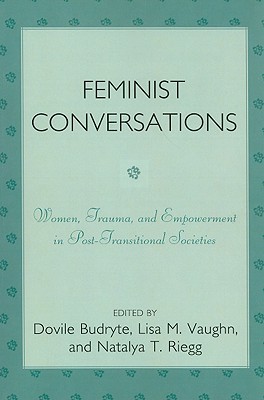
- We will send in 10–14 business days.
- Publisher: University Press of America
- ISBN-10: 0761843795
- ISBN-13: 9780761843795
- Format: 15 x 22.4 x 1.5 cm, softcover
- Language: English
- SAVE -10% with code: EXTRA
Feminist Conversations (e-book) (used book) | bookbook.eu
Reviews
Description
Feminist Conversations is a forum of cross-cultural communication among women from different parts of the world, as well as from different life paths. It draws on several disciplines, including gender studies, psychology and political science, to gain insight into the following questions: Do post-transitional societies become more women-friendly as they become more democratic? Which strategies of empowerment can women use to obtain political voice and improve their everyday lives? How do they cope with traumatic experiences and memories? Women's rights activists and feminist scholars from Lithuania, Armenia, South Africa, Guatemala and the United States reflect on the productivity of different practices for increasing political standing, the efficiency of different methods of dealing with gender violence and the different empowerment mechanisms of coping with trauma. The authors engage in a dialogue about the applicability of these practices, methods and mechanisms to various countries and cultures.
EXTRA 10 % discount with code: EXTRA
The promotion ends in 10d.02:23:40
The discount code is valid when purchasing from 10 €. Discounts do not stack.
- Publisher: University Press of America
- ISBN-10: 0761843795
- ISBN-13: 9780761843795
- Format: 15 x 22.4 x 1.5 cm, softcover
- Language: English English
Feminist Conversations is a forum of cross-cultural communication among women from different parts of the world, as well as from different life paths. It draws on several disciplines, including gender studies, psychology and political science, to gain insight into the following questions: Do post-transitional societies become more women-friendly as they become more democratic? Which strategies of empowerment can women use to obtain political voice and improve their everyday lives? How do they cope with traumatic experiences and memories? Women's rights activists and feminist scholars from Lithuania, Armenia, South Africa, Guatemala and the United States reflect on the productivity of different practices for increasing political standing, the efficiency of different methods of dealing with gender violence and the different empowerment mechanisms of coping with trauma. The authors engage in a dialogue about the applicability of these practices, methods and mechanisms to various countries and cultures.


Reviews